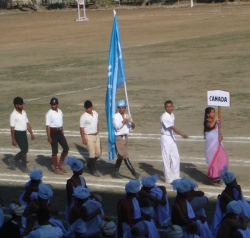Selection of Canada's national equestrian skill-at-arms team.

UNICEF Team Canada March-Past
Jet lag had me out of bed and pacing my hotel room at 3am on the opening day of the International Tent Pegging Championships. I pondered the plumbing arrangements in my bathroom: the sink and commode were integrated into the shower, presumably so that a guest's ablutions would also serve as a means of washing the facilities. It was a terribly clever, if rather septic, way to conserve water.
I eventually tumbled downstairs to the lobby, where the house rules were writ large, warning guests against the evils of strong drink, gambling, and the temptations of the opposite sex. The officer in charge of my security detail was waiting for me, an unidentified beverage in one hand and a deck of playing cards in his breast pocket, but with no social company that I could see.
We drove to the stadium, never pausing for man, beast, or oncoming vehicles. I noticed that, in a burst of characteristically Indian prestige inflation, there were seats in the stands reserved for VIPs, for VVIPs, and for VVVIPs. They all looked equally uncomfortable.
The venue was the Imphal Polo Ground. Located in the city centre, it is the oldest operating polo field in the world: it was hosting polo matches in 33 AD, and it continues to host regular fixtures to this day. Far from the elitist fantasies of Ralph Lauren commercials, polo in Manipur is a sport of the masses: after working their fields, many farmers unhitch their horses from the plough and ride social chukkas with their neighbours.
Polo in Manipur is also alarmingly aggressive. Riders may intentionally collide with one another, may pull one another out of the saddle, and may even pummel one another with their mallets. Tent pegging is almost safe by comparison.
The opening ceremonies featured a (rather more sedate) demonstration of polo, much speechifying by a procession of political grandees, a good deal of uniformed marching about, the release of helium balloons carrying celebratory banners aloft, and a performance by a vast array of dancers. Alas for the dancers, they practised their craft in bare feet, after the horses had left their calling cards on the field.
The most important part of the day, however, was the draw for horses and the announcement of the national teams.
In the lottery that randomly paired riders with unfamiliar mounts, I drew a thoroughbred named Gagan. It was, I thought to myself, a good omen: "Gagan" is the Jain-language translation of "Akaash". Then he bit me. Chance, my own horse at home in Canada, would certainly have approved.
The selection of teammates was not as painful, nor did it leave a scar.
I had competed in the 2007 International Tent Pegging Championships as an individual, but for the 2008 championships, I needed to enter a full team of four. As I was the only New World competitor invited to the 2008 championships, UNICEF Team Canada would be a composite multinational team of riders selected by me. Fortunately, because of all the equestrian competitions held in Imphal prior to the international championships, the city was awash with riders who had not made the cut for their respective teams.
As all of my childhood friends will certainly attest, I was never one of nature's athletes, and no one was more surprised than I was when I took up riding as an adult and began representing Canada. Not surprisingly, I will always my first affinity with those who hope for a second chance.
There were legions of horseless riders remaining in Imphal, but the choice of teammates proved surprisingly easy. Bimol Singh, Jeetender Singh, and Talwinder Singh (no, none of them were related) stood out for me not simply because they were well-recommended as tent peggers, but still more because they treated the horses with compassion and treated the grooms with respect.
Far too often in equestrian sports, competitors see horses not as living, thinking, feeling creatures, but as automatons who can be compelled by force or terror to do a rider's bidding. Just as often, competitors show extravagant indifference to the grooms who provide the vital but unglamorous work of caring for the horses, mending equipment, and mucking out the stables, and who into the bargain are frequently the unsung best horsemen on the field.
I may be something of a damp-eyed idealist, but I sincerely believe that in the long term, the person whose impulse is to do good is the person most likely to do well. More importantly, I am conscious that when we take to the field under the banner of UNICEF Team Canada, my teammates and I ride first and foremost for the honour of my country and the cause of the world's children, not for medals, ribbons, or other baubles.
I saw Bimol abandon a run out of concern for his horse, rather than carry on in an attempt to win glory for himself at the animal's expense. I saw Jeetinder retire after his runs to the grooms' tent to socialise with them, rather than put his feet up with the athletes whose own grooms were polishing their boots. I saw Talwinder advising riders from visiting teams, even though he knew that they would use that advice to try to best him. And I knew I was looking at the three riders whom I should be proud to call my teammates.
The four of us had never met before, we had three different mother tongues between us, and we would have only two days to prepare before we would compete as a team. "Ride hard and ride fast, or ride home," goes the cavalier's proverb. And I was a very long way from home.
 » To return to my main blog page, please click here.
» To return to my main blog page, please click here.